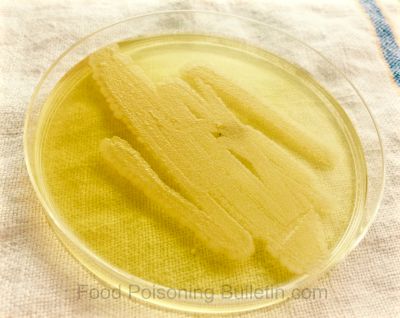A study published in the online journal PLoS ONE has found that the antibiotic-resistant bacteria Staphylococcus aureus is found on pork for sale in grocery stores around the country.
 In 2010, researchers from the University of Iowa’s College of Public Health and the Institute for Agriculture and Trade Policy tested 395 samples of pork from 36 urban and rural grocery stores in Minnesota, Iowa, and New Jersey. Staphylococcus aureus was found on 65% of the samples. And 7% of the pork tested positive for methicillin-resistant Staphylococcus aureus, also known as MRSA.
In 2010, researchers from the University of Iowa’s College of Public Health and the Institute for Agriculture and Trade Policy tested 395 samples of pork from 36 urban and rural grocery stores in Minnesota, Iowa, and New Jersey. Staphylococcus aureus was found on 65% of the samples. And 7% of the pork tested positive for methicillin-resistant Staphylococcus aureus, also known as MRSA.
Pork cutlets were the type of cut most contaminated. Six of the seven positive samples came from the same retail chain, but in two different states. The study author said that they don’t know where the pork becomes contaminated during the production process.
MRSA is a dangerous bacteria that hospitals and health care facilities have been battling for years. The bacteria is resistant to 10 types of antibiotics, including tetracycline, erythromycin and clindamycin.
In institutional settings, the bacteria get into cuts and exposed wounds, causing serious infections. In food, the bacteria produce toxins that can make you sick. But simply handling meat contaminated with MRSA can be a health risk.
The study took alternatively raised pork into consideration too, and found that there was no statistically significant difference in MRSA contamination between pork raised organically, without antibiotic treatment, and pork raised with “traditional” methods on factory farms. The study did not compare “certified organic” products and products that claim to be raised organically but are not certified by the USDA.
This result is in stark contrast to a study published in the Netherlands that found organically raised chickens have less bacterial contamination than conventionally raised poultry.
Another study of U.S. pigs found that MRSA was found in almost 50% of “conventional” pig farms, but not found on certified organic farms. This may be explained by the fact that the two types of pork are often processed in the same plants, causing cross-contamination. Equipment is supposed to be cleaned before processing certified organic pork, but mistakes are made.




